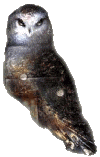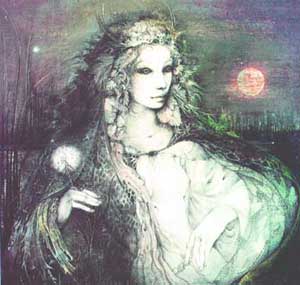
Below are listed the major gods and goddesses known in
Welsh mythology, along with
a listing of magical powers
associated with them.

Arianrhod (ari-an-rod): "Silver Wheel"; star or sky goddess; goddess of reincarnation; Full Moon goddess. Her palace is called Caer Arianrhod (Aurora Borealis). She is the Keeper of the circling Silver Wheel of Stars, a symbol of karma. Mother of Lleu Llaw Gyffes and Dylan by her brother Gwydion. Her original consort was Nwyvre (Sky or Firmament). Mother aspect of the Triple Goddess, honored at the Full Moon. Beauty, fertility, reincarnation.

Blodeuwedd (blod-oo-eeth): "Flower Face"; "White Flower." Lily maid of Celtic initiation ceremonies. Also known as the Ninefold Goddess of the Western Isles of Paradise. Created by Math and Gwydion as a a wife for Lleu. She was changed into an owl for plotting Lleu's death and for her adultery. She is the Maiden form of the Triple Goddess; her symbol is the owl. Flowers, lunar mysteries, initiations.
Branwen (bran-oo-en): Sister of Bran the Blessed and wife of the Irish king Matholwych. Daughter of Llyr; one of the three matriarchs of Britain; Lady of the Lake (cauldron). Goddess of love and beauty.
Brid (breed): "Power"; "Renown"; "Fiery Arrow or Power" (Breo-saighead); called the poetess. Often called the Triple Brigids, the Three Mothers; associated with Imbolc. She had an exclusive female priesthood and an ever-burning sacred fire. The number of her priestesses was nineteen, representing the nineteen-year cycle of the Celtic Great Year. Goddess of fire, fertility, and the hearth. Healing, inspiration, learning, divination, love, witchcraft.
Cerridwen: Moon Goddess; Great Mother; grain goddess; goddess of Nature. Wife of the giant Tegid and mother of a beautiful girl Creirwy and an ugly boy Avagdu. Welsh Bards called themselves Cerddorion (sons of Cerridwen). The Bard Taliesin, their founder, was said to be born of Cerridwen and to have tasted a potent brew from her magic cauldron of inspiration. This potion, known as 'greal,' was made from six plants for inspiration and knowledge. Taliesin accidentally drank the remaining three drops of the liquid. Her symbol was a white sow. Death, fertility, regeneration, inspiration, magic, astrology, herbs.
Creiddylad/Cordelia : Daughter of the sea god Llyr. Associated with Beltane and often called the May Queen. Goddess of summer flowers. Love, flowers.
The Crone: One aspect of the Triple Goddess. She represents old age, death, Winter, the waning Moon, all destruction that comes before regeneration through her cauldron of rebirth. Crows are sacred to her. Dogs would accompany her and guard the gates of her after-world, helping her receive the dead.
Don/Donn: "Deep Sea"; "Abyss;" goddess of sea and air. Sometimes referred to as a goddess, sometimes a god. Control of the elements, eloquence.
Great Mother: The Lady; female principal of creation. Goddess of fertility, the Moon, love, healing, water. The index finger was considered the "mother finger," the most magical which guided, beckoned, blessed and cursed.
The Morrighan: "Great Queen"; "Queen of Phantoms"; "Specter Queen"; a shape-shifter. Reigned over the battlefield, helping with her magic. Associated with crows and ravens. The Crone aspect of the goddess; Great Mother; Moon Goddess; Great White Goddess; Queen of the Fairies. In her Dark Aspect (the symbol is then a raven) she is the goddess of war, fate and death. The carrion crow is her favorite disguise. Goddess of rivers and lakes. Patroness of priestesses and witches. Revenge, night, magic, prophecy.

Rhiannon (rhi-an-non): Her name translates into "The Great Queen"
or "divine." She is a symbol of fertility, but is also a death goddess.
She is a bringer of dreams, and is regarded as a moon deity.
Goddess of horses and birds,
enchantments and the Underworld, she rides a white horse.
She was
married both to Pwyll and Manann. Her stories appear in the
Mabinogion.
In magic, she aids in overcoming enemies, exercising patience, moon rituals,
and dream work.

Arawn (ar-awn): the King of Hell; god of Annwyn, the underground kingdom of the dead. Revenge, war.
Bran (bran): A giant; "the blessed." Brother of the mighty Manawydan ap Llyr and Branwen; son of Llyr. Associated with ravens. God of prophecy, the arts, war, the Sun, music.
Cernunnos (ker-noo-nos): The Horned God; God of Nature; god of the Underworld and the Astral Plane; The Druids knew him as Hu Gadarn, the Horned God of fertility. He was portrayed sitting in a lotus position with horns on his head, sporting a beard, and wearing a neck torque; sometimes holding a spear and shield. His symbols are the stag, ram, and horned serpent. Virility, fertility, animals, Nature, reincarnation, wealth, warriors.
Dylan: Son of the Wave; god of the sea. Son of Gwydion and Arianrhod. His symbol was a silver fish.
Govannon (gov-ann-on): "Great Smith"; one of a triad of craftsmen (with Luchtaine the wright and Credne the brazier). Similar to Vulcan. He forged weapons that always hit their mark. God of blacksmiths, jewelry making, fire, metal-working.
Great Father: The Horned God. Lord of the Winter, harvest, land of the dead, animals, mountains, powers of destruction and regeneration; the male principle of creation.
The Green Man: See Cernunnos. A horned deity of the woodlands. In Old Welsh his name is Arddhu (The Dark One).
Gwydion (Gwi-dee-on): Druid of the mainland gods; son of Don; brother of Govannon, Arianrhod and Amaethon. Wizard and Bard of North Wales. A many-skilled deity (like Lugh); a shape-shifter. His symbol was a white horse. Greatest of the warrior-magicians. Illusion, magic, healing.
Gwynn ap Nudd (gwin ap neethe): King of the Fairies and the underworld. Later he became king of the Plant Annwn, the subterranean fairies.
Gwythyr (gwee-theer): Opposite of Gwynn ap Nudd. King of the Upper World.
Llud (hlood) of the Silver Hand: "He who bestows wealth"; "the Cloud- Maker." Similar to Neptune. He had an invincible sword. God of healing, water, the Sun, youth, carpenters, historians, writing, warfare, incantations.
Llyr (thleer): God of the sea, and possibly of the underworld. The father of Manawyddan, Bran the Blessed, and Branwen.
Lugh (loo or loog): The Shining One; Sun god; god of war; "many- skilled"; "fair-haired one"; a hero god. His feast is Lughnassadh, a harvest festival. Associated with ravens. His symbol was a white stag. Son of Cian and Ethniu. Lugh had a magic spear and rod-sling. He was a carpenter, mason, smith, harper, poet, Druid, and physician. War, magic, reincarnation, lightning, water, journeys, poets, musicians, sorcerers, healing, initiation.
Manawydan ap Llyr (man-au-yth-an ap thleer): dressed in a green cloak and a gold headband; a shape-shifter. Son of the sea god Lir. He had a palace called Emhain of the Apple Trees. His swine constantly renewed themselves and were a chief source of food that would keep people from aging. He had famous weapons: two spears called Yellow Shaft and Red Javelin; swords named The Retaliator, Great Fury and Little Fury. His boat was called Wave Sweeper, and his horse Splendid Mane. He had magic armor that prevented wounds and could make warriors invisible at will. God of the sea, storms, weather-forecasting, arts, commerce, rebirth.
Math Mathonwy (math math-on-oo-ee): God of sorcery, magic enchantment.
Myrddin (meer-din): Great sorcerer; a Druid. Associated with the fairy religion of the Goddess. Old Welsh traditions called him a wild man of the woods with prophetic skills. He is said to have learned all his magic from the Lady of the Lake. Tradition says he sleeps in a hidden crystal cave. Illusion, shape-shifting, herbs, healing, Nature, divination, crystal reading, tarot, magic, artisans.
Pwyll (pe-ool): Occasionaly ruler of the Underworld. Also known as Pwyll pen Annwn (Pwyll head of Annwn). Cunning.
Taliesin (tal-i-ess-in): Prince of Song; Chief of the Bards of the West. Patron of Druids, Bards and minstrels; a shape-shifter. Writing, poetry, wisdom, wizards, Bards, music, knowledge, magic.

Aer (air): Goddess of war and goddess of the River Dee.
Amaethon: God of agriculture.
Arthur/Arth Vawr (Heavenly Bear): King and leader of the Knights of the Round Table. The Round Table symbolized the goddess Arianrhod's Silver Wheel of rebirth, and the Grail the sacred cauldron of inspiration and reincarnation.
Caradawc: "Strong-armed"; Son of Bran.
Cwn Annwn (koon anoon): hounds of Arawn, later called hell hounds. They are usually seen as a portent of death.
Cyhiraeth (kerherrighth): Goddess of streams. Later she became like a Banshee.
Elaine: Maiden aspect of the Triple Goddess in Arthurian legend.
Evnissyen (ev-ness-jen): "Lover of Strife"; a giant. Half-brother of Bran.
Iweridd (i-oo-er-ith): One of Llyr's wives.
Kai (kay): A god of fire and smithing.
Margawse: Mother aspect of the Triple Goddess in Arthurian legend.
Morgan le Fay: Morgan the Fate; Death-goddess. Glamorgan in Wales is considered to be her sacred territory. She can cast a destroying curse on any man. Gawaine of the Round Table bore Morgan's pentacle as a heraldic device on his shield.
Nissyen (ness-jen): "Lover of Peace"; a giant. Half-brother of Bran.
Owein ap Urien: God associated with ravens; Wisdom, magic, war, reincarnation.
Penardun: Daughter of the goddess Don; one wife of Llyr.

Sources
Celtic Magic
The Celtic Tradition
Celtic Myth & Magick
The Mabinogion is a selection of stories
from
the White Book of Rhydderch,
the Red Book of Hergest and the Hanes of
Taliesin.
 Druid Lore
Druid Lore

Rowan's Icons